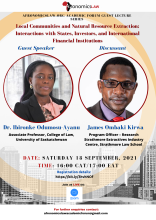Failure at COP26: The Global South Doesn’t Need Another Loan
COP26 ended with a palpable sense of despair as industrialised states failed once again to deliver on long-standing commitments to finance adaptation and mitigation efforts in the Global South.
As attempts to reach accord floundered, private capital materialised as the most likely source of this vital funding. Whilst their dire situation may leave post-colonial states with no option but to accept this investment, its continued entrenchment in the economies and polities of the Global South can only serve to perpetuate the centuries-long cycle of subordination, dependence, and debt.

